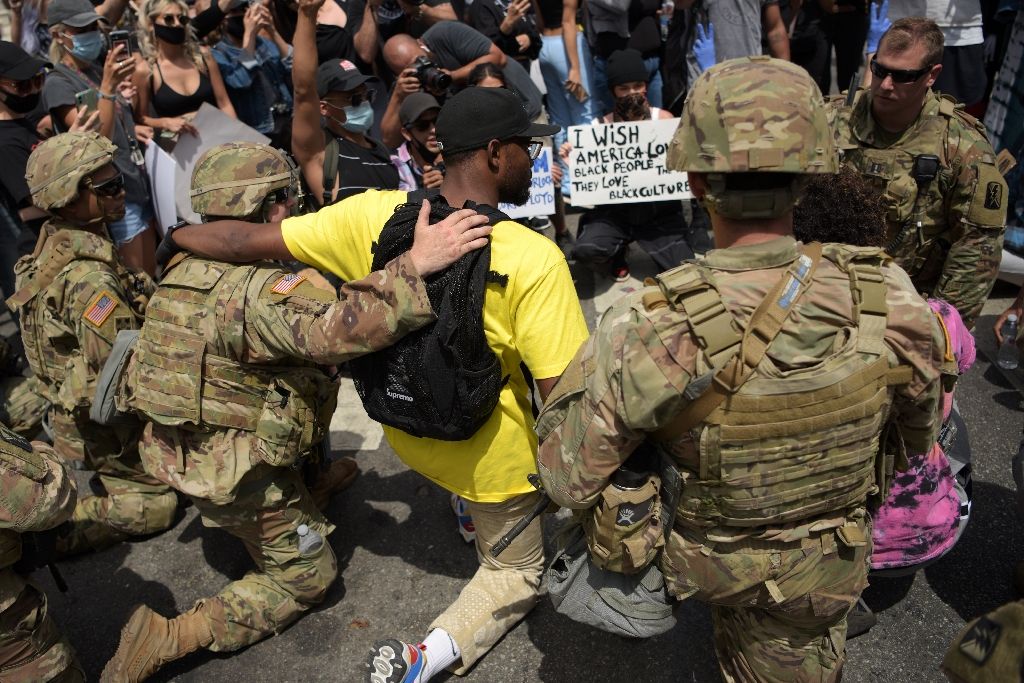Memory of Rodney King riots looms over LA protests
()
(AFP)
Protests across Los Angeles have stirred up painful memories of the city’s notorious Rodney King and Watts race riots, when African-American anger over police brutality resulted in deadly clashes.
Like the current demonstrations, both the 1992 and 1965 episodes in the West Coast metropolis were triggered by police violence against black men.
The 1992 beating of King by four LAPD officers was even filmed by a member of the public — a precursor to the viral social media footage of George Floyd’s killing in Minneapolis.
“Sadly, in many ways, ain’t nothing changed but what year it is,” said University of Southern California (USC) law professor Jody David Armour.
“There’s a pervasive and persistent pattern of police brutality against black Americans that triggers massive protests.”
It is a widely held view, from NBA legend Kareem Abdul-Jabbar telling CBS “nothing has changed since what was supposed to be a routine traffic stop of Rodney King,” to protestors on the streets this week.
Jessica Hubbert, a 30-year-old demonstrating in Hollywood, said the LAPD “have not improved anything in Los Angeles… even though we’re protesting, they’re still hurting us.”
But activists and academics point to key shifts, especially concerning the racial identities of those involved.
The violence in the neighborhood of Watts in 1965 was sparked when police did an identity check on two black men in a car.
Watts, along with other mainly black areas in South Los Angeles, were the focus of violence then and in 1992.
But they have remained quiet in recent days.
Instead, looting and brawls have raged across tourist hotspot Hollywood and affluent areas such as Beverly Hills and Santa Monica.
– ‘Outside actors’ –
John Jones III, a community leader, is among several pre-emptively calling for calm in Watts neighborhoods.
“People (here) are definitely following what’s going on throughout the city… they get the anger and rage,” he said.
But “we’ve been through this a few times already… they understand the stresses of a riot, the stresses of tearing down their own neighborhood,” added Jones, who runs the East Side Riders Bike Club for local children, and distributes meals.
He told AFP youths from his community are going to areas like Downtown to protest, and admitted he cannot be “100 percent sure” none are involved in criminal acts like looting elsewhere.
But with “smartphone journalism” in 2020, citizens are showing “more than one face looting,” said Allissa Richardson, author of “Bearing Witness While Black” and USC assistant professor of journalism.
“Before we would have seen with the Watts riots or the Rodney King riots, people of color doing most of the damage in their own community, and America kind of shaking its head.”
“Now we’re seeing outside actors come in who don’t look like the victims of this actual killing — white activists coming in and destroying and defacing property.”
– ’92 means nothing’ –
Despite 2,700 arrests for criminal activity, Los Angeles has not reported any deaths in the ongoing protests. Some 63 perished in the King riots, and 34 during the Watts unrest.
The fact Floyd’s death was not at the hands of the LAPD may have stemmed anger, said Jones.
“In ’92 I think it hit a little closer to home — it was our police department,” he said. “So the frustration was, ‘let’s do what we can to make them feel our pain.'”
He added: “But it still hurts just as bad.”
Both the level of organization — and identity of those protesting — are also different in the Black Lives Matter era, said Armour.
“Many of the marchers you see out here on these protests over the last several days, are non-black marchers,” he said, noting many young white, Asian and Latino participants.
“And so I think there’s a growing recognition… that we do have profound problems when it comes to valuing black lives.”
Hubbert, the protester in Hollywood, said comparisons with Rodney King or Watts were less meaningful than trauma that has been going on for centuries.
“’92 means nothing,” she said. “We are fighting for the last five hundred years of African-American civil people.”
Andrew MARSZAL
Disclaimer: Validity of the above story is for 7 Days from original date of publishing. Source: AFP.


